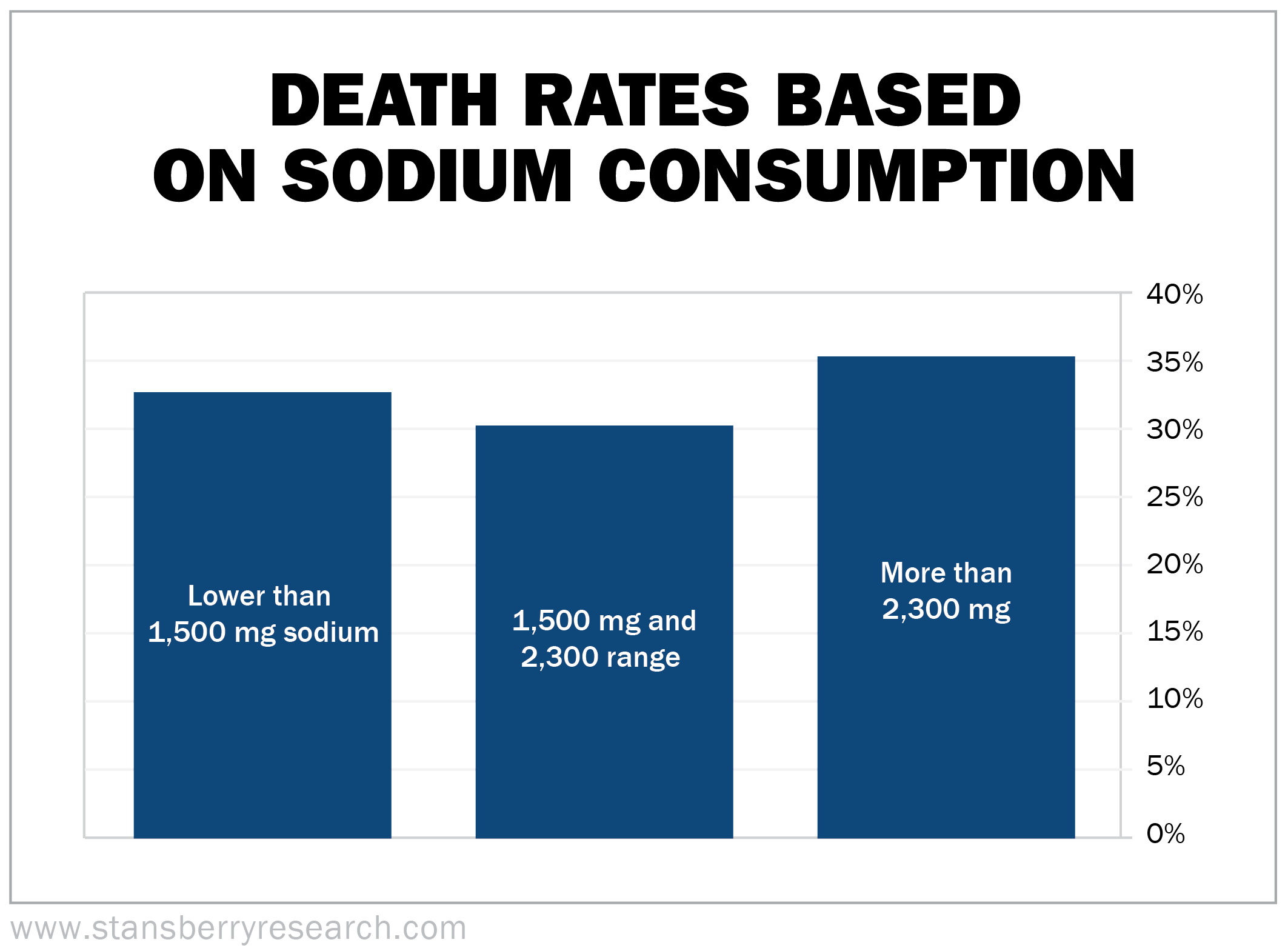"How to Live Longer With These Three Lifestyle Changes."
That kind of promise makes for a splashy headline. We saw plenty of titles like this one (which was from HuffPost U.K.) last week in the wake of an article from researchers at Harvard. Published in Circulation, the article has a giant promise: These three interventions, if applied globally, will prevent 94 million premature deaths.
In other words, folks who make these three changes would lower their risk of dying early from cardiovascular disease. Currently, about 17.9 million people die from these diseases (including heart attack and stroke) each year. In the U.S. alone, that number is around 610,000.
The truth is, we already know about these lifestyle changes. I've beaten the drum about two of them over the years (and railed against overdoing the third one).
The three tips are:
- Keep your blood pressure low.
- Stop eating trans fat.
- Cut your salt intake.
These seem like common sense... so today, I'm going to remind you of my best tips for each one.
Watch Your Blood Pressure
Regular readers know about my push to lower your blood pressure. You can do it naturally with some easy tips like these:
1. Get active. Aim for at least 30 minutes of exercise five days a week. I like to take a 30-minute walk every day to get my exercise in.
2. Eat more vegetables (especially green, leafy veggies), fish, and whole foods.
3. Cut out fatty foods and the ones I call the "white killers" (white flour, white potatoes, white sugar). Some foods that reduce blood pressure are dark chocolate, eggs, wine, olive oil, and foods high in potassium.
4. Cut the caffeine. Along with stress, caffeine can raise your blood pressure. Remember not to have that morning coffee before going to the doctor for a test or before taking one at your local drugstore. You might also consider cutting multiple cups down to just one or two a day.
5. Keep track of your blood pressure. Start a log of your blood-pressure readings. Write your test results down at the doctor's office. If you get a high-pressure reading, wait a few days and try it again.
6. Meditate regularly. This can quickly relieve sensations of stress. After a few months of regular meditation, research shows you can lower your blood pressure by at least 10 points without visiting a doctor or using medications. Try meditating before getting your blood pressure checked as well... and even during the test itself. The results will surprise you.
Skip the Processed Foods
As for trans fats, this is something I've told my readers to avoid for years.
Trans fats are the worst kind of fat. They're purely man-made and are difficult for your body to break down. In fact, they send your immune system into overdrive, promoting inflammation and wreaking havoc on your body. And we know that inflammation is the key driver of heart disease.
Trans fats are in many fried foods. Many companies now offer foods free of trans fats, but you need to double check food labels. Trans fats also appear in plenty of processed foods, including frozen pizza, microwave popcorn, and margarine. But remember, if you want to enjoy these foods, just do so in moderation.
Hit the 'Goldilocks' Salt Curve
As for salt, this is a good reminder to cut back... but don't cut it out completely.
Salt and its harmful effects show up statistically on a U-shaped curve, also called the "Goldilocks" curve. In other words, too much is bad and too little is bad.
You want to hit the sweet spot. But the amount that's "too much" isn't as clear as the experts would have you believe.
For example, a study published in 2015 in the Journal of the American Medical Association: Internal Medicine found that modest amounts of salt in your diet aren't harmful. Researchers found that, after a decade, participants who consumed the highest level of the "recommended" salt intake (2,300 mg of sodium) were no more likely to experience heart disease, stroke, heart attack, or heart failure than those who ate less salt.

The study found that death rates were lowest in people getting between 1,500 mg and 2,300 mg of salt per day, at 30.7%. The death rate was 33.8% in people consuming less than 1,500 mg and 35.2% in people consuming more than 2,300 mg.
Not enough salt can also raise your blood pressure and lead to things like muscle cramps, nausea, and mental confusion. It also contributes to falls in older folks.
So you want to aim for this middle group – between 1,500 mg and 2,300 mg. But salt hides in a lot of foods you might not suspect... in particular, processed foods. Canned soup, bread, lunch meat, and even cereal contain a few hundred mg. Just a simple ham and cheese sandwich will put you near the 2,300 mark.
Do what I do and eat more whole, natural foods. (This also helps you avoid trans fats, too.) And if you do go for the pre-packaged stuff, do your due diligence and check the label first.
These three tips are ones you should already follow. If not, follow my easy tips to live a healthier, longer life.
What We're Reading...
- Something different: Sleeping with the TV on? Here's why it wrecks your health.
Here's to our health, wealth, and a great retirement,
Dr. David Eifrig and the Health & Wealth Bulletin Research Team
June 18, 2019
